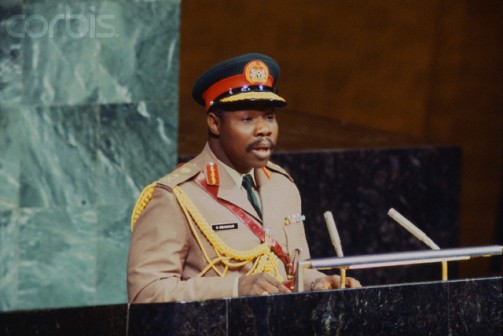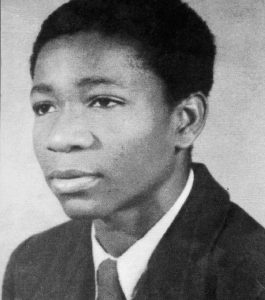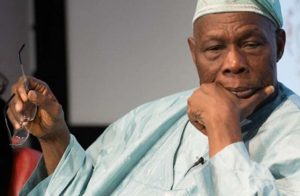Respect is not an Entitlement
Posted by By Akogun Akomolafe at 31 August, at 17 : 27 PM Print

Warning: count(): Parameter must be an array or an object that implements Countable in /home/alaye/public_html/wp-content/themes/Video/single_blog.php on line 56
“The national bourgeoisie discovers its historical mission as intermediary. As we have seen, its vocation is not to transform the nation but prosaically serve as a conveyor belt for capitalism, forced to camouflage itself behind the mask of neocolonialism. The national bourgeoisie, with no misgivings and with great pride, revels in the role of agent in its dealings with the Western bourgeoisie. This lucrative role, this function as small-time racketeer, this narrow-mindedness and lack of ambition are symptomatic of the incapacity of the national bourgeoisie to fulfil its historic role as bourgeoisie. The dynamic, pioneering aspect, the inventive, discoverer-of-new-worlds aspect common to every national bourgeoisie is here lamentably absent. At the core of the national bourgeoisie of the colonial countries a hedonistic mentality prevails—because on a psychological level it identifies with the Western bourgeoisie from which it has slurped every lesson. It mimics the Western bourgeoisie in its negative and decadent aspects without having accomplished the initial phases of exploration and invention that are the assets of this Western bourgeoisie whatever the circumstances. In its early days the national bourgeoisie of the colonial countries identifies with the last stages of the Western bourgeoisie. Don’t believe it is taking short cuts. In fact it starts at the end. It is already senile, having experienced neither the exuberance nor the brazen determination of youth and adolescence.” – Frantz Fanon, The Wretched of the Earth.
About three decades ago, Nigeria’s Literature Nobel Laureate, Wole Soyinka, made the following damning indictment of his generation: “… after a quarter of a century of witnessing and occasionally participating in varied aspects of social struggle in all their shifting tempi, dimensions, pragmatic and sometimes even ideologically oriented goals, I feel at this moment that I can only describe my generation as the wasted generation, frustrated by forces which are readily recognisable, which can be understood and analysed but which nevertheless have succeeded in defying whatever weapons such ‘understanding’ has been able to muster towards their defeat.”
Last year, former Nigerian leader, Olusegun Obasanjo, leveled the same unfavorable accusation against generation after his own, that is my generation: “… the generation before us gave us and our country independence. Whatever you like, say about them: the Awolowos, Nnamdi Azikiwes, the Sardaunas, Aminu Kanos, Tafawa Balewas, and others; they gave us independence, they were not perfect and if you like you can even go from now till tomorrow to condemn what they did, but they gave us independence.”
“These people and my generation laid the foundation for the democracy we enjoy today. Our democracy is not perfect, our democracy is a journey and not a destination and we must continue to improve on it. My sons and daughters, what will your generation do? Condemnation is easy but what will you do?”
Octogenarian Soyinka packs an incredible and unimpeachable credentials. He has been an activist throughout his life. He was barely in his thirties when he held up a radio station in Western Nigeria to protest against government corruption. He was there at the forefront of those who tried to stop Nigeria mad civil war. For his trouble, the government of Yakubu Gowon threw him into solitary confinement. He told us the tales of his tribulation in his classic, ‘The man Died.”


Wole Soyinka, age 18, a college freshman (Courtesy of Wole Soyinka)
Uncle Soyinka said: “The man died in the man who kept silent in the face of tyranny.”
Undaunted by his inhumane incarceration, the Nobel Laureate continue to battle every Nigerian government, including the dreaded Abacha regime. He was a relentless anti-corruption crusader and an indefatigable human rights advocate. Few human beings pack his moral authority.
General Olusegun Obasanjo belongs in Soyinka’s generation. Despite all his faults, Obasanjo also made an immense contribution to the development of both Nigeria and Africa. His generation fought to keep Nigerian one. And during his first stint as Nigeria military ruler, Obasanjo gave Nigeria the highest international profile the country ever enjoyed. He continued with his predecessor, General Murtala Mohammed, emphatically Pan-African stance, which made Africa the centerpiece of Nigeria’s foreign policy and allowed Nigeria to become a member of the Frontline States confronting apartheid South Africa, even though the country was geographically thousands of miles away from the theatre.


Obasanjo’s government nationalization of British Petroleum over Zimbabwean independence negotiations, undoubtedly helped to concentrate the minds of Margaret Thatcher and her colleagues that Zimbabwe had to be given her independence. Read Uncle Sege’s damning letter to Margaret Thatcher over apartheid South Africa here:
Although not widely liked or acknowledged, very few African leaders contributed more than Obasanjo to the cause of Africa’s liberation – see my Obasanjo’s agonistes here.
If Soyinka, who contributed so immensely to the development of his country, can be so merciless in the condemnation of his generation, what is the present generation to do? How do we answer General Obasanjo’s potent question? And what will be history’s verdict on the immediate generation after that of Soyinka and Obasanjo, mine?
If both gentlemen whose generation gave so much hope and optimism to my generation can feel inadequate and guilty, what is my generation supposed to feel?
Whatever defects those gentlemen possess as human beings, there is not a single member of my generation that comes remotely close to their stature. I cannot think of anyone in my generation in whose heart burned the same fervent fire of fierce Nigerian nationalism and unstinting African patriotism, that burned in their hearts.
Very sadly, it is very difficult to pinpoint a single redeeming feature of my generation.
Whichever way we throw it around, we are a failed, wasted and an accursed generation.
Mine is a generation without shame. Our insatiable and capricious gluttony is parenthesized only by an insane primitive acquisitiveness. Not only did we frittered away every patrimony bequeathed to us, we singularly failed to add a single value to our society.
Rather than take offense by these unflattering rendering, those who disagree should kindly come to our rescue and point to something, anything, we should be proud of.
On the economic front, Obasanjo’s generation left for Nigeria an upward-looking economy with plans for accelerated industrialisation. There were industrial estates all over town. Peugeot and Volkswagen had large vehicle assembly plants in Nigeria. The Nigerian textile industry was a very vibrant one. The national currency, the Naira, was stronger than the American dollars. Many excellent motorways, air, and sea-ports were built across the land. Nigerians go abroad only to go and study, acquire knowledge and come back home. They were assured of living the same Middle-Class lifestyle their counterparts in Europe and the USA were living.
Nkrumah dreamt of turning Ghana into a developed country within the shortest possible time. He embarked on massive industrialisation programmes that were dizzying in their ambitions. The Akosombo Dam and the Atomic Energy projects were just two. Nkrumah set up about four hundred industrial projects during his comparatively short reign. Let us not even delve into the Osagyefo’s dynamic foreign policy that gave Ghana high profile totally out of sync with the country’s small size.
On the political sphere, the generation before mine was one where only very serious people dare to put themselves up for presidential or even gubernatorial elections. In those days, elections have not become what is today, a do-or-die competition between loutish scallywags and pure ragamuffins.
It is difficult not to wax nostalgic, but the generation of Soyinka, Obasanjo and Nkrumah will be fondly remembered as the last generation where discipline and respect for traditions ruled supreme.
We do not argue that everything was okidoki, but it was a time when people still anchor themselves to values and ethos that glorify hardwork, discipline, honesty, and respect for one’s name and integrity.
It was my generation that sold off all the industries the previous generations struggled to build. It was my generation that sold off almost national patrimony with little to show for it except massive debt and general impoverishment across the land.
We met societies that were not very opulent, but the previous generations struggled to make sure that free treated water was available to citizens. Electricity was stable then than it was today.
Our grandparents fought hard to win independence for us. Today, we have managed to sell Africa back to new colonisers, leaving our children the burden to fight for their own emancipation. Our parents did not have much, but they starved themselves and denied themselves life’s luxuries so that they can send us to school. They made huge sacrifices to ensure that our lives become better than theirs. Many of them live in small houses, even in hovels, and they spent long hours to trek and work in their farms, eke out a miserable existence, so as to guarantee us a better life.
And how did we pay them back? By becoming selfish and greedy. By becoming totally incapable of taking any thought for the morrow. By not being able to think beyond our stomach, our own comforts.
We took for granted all the sacrifices lavished on us by our parents, today, we shamelessly deny our children the same thing. What could be more terrible than to listen to some among us, beneficiaries of free education policies, arguing, without any sense of irony or shame, that free education is not possible for our children?
We can drive around town in the most expensive jeeps that money can buy, but we cannot find the money to educate our children. Our mansions are more opulent than those of Arabian rulers, while we condemn the majority of our own citizens to wretched lives in Ghosttowns – that is ghettoes within ghettoes. We are glib and eloquent when it comes to denying our compatriots the same luxuries we take for granted and cannot do without. Without blinking an eye, we sentenced our fellow citizens to lives of miseries under SAP, ESAP, HIPC, and whatnots, while our stomachs bulge and spill over into Executive Pouches. My generation saw nothing wrong or ironic in dressing up in the best Saville Row suits and drive around in expensive jeeps to meetings where they append signatures to IMF and World Bank Austerity measures, that devastate our economies, wipe away our nascent middle class, and turn our currencies into Monopoly money.
Unluckily for us, our children today have access to the internet with its vast resources, that were unimaginable a few years ago.
So, they can compare notes with their peers scattered around the globe. They can see the wonders human minds have created while we wallow in stupid superstitions. They need no one to tell them how badly we have let them down. They need no one to convince them about our backwardness, and our apparent inability to even grasp how far behind other people we truly are. They need no further proof that we remain the Fanonian Wretched of the Earth.
They will, rightly, ask us where we were when other people invested so heavily in mathematics, science, engineering, and technology. Our Children will certainly want to know what we invested for them. The questions of our children will be many. What would our answer be when our children ask us why parents in other climes left their children with great citadels of learning, awesome laboratories, and research centers, while all we leave for them are shiny but useless cathedrals and mosques? They very surely will ask us why we crammed their head full with useless religious tracts, while other parents filled the brains of their children with computer programming languages, robotics, and AI skills?
With the exception of mine, every generation, strive to leave a better society than they met for their children. It was parents’ prayers that their children should be greater and better than them.
Unfortunately, this was not so with my generation. We focused only on how to aggrandize our personal comforts. Only the primitive acquisition of material things excites us. We crave the latest exotic vehicles the way famished hyenas crave food. Production is not our thing, only wanton consumption. We did not build any productive venture worth mentioning, importation was our only interest. The only competition that holds us in sway is to compare our mansions with the best in society. Crass materialism was the only thing that consumes our lives. Our focus and vision did not extend beyond our stomachs. The Nigerian writer, Kole Omotosho, very brilliantly captured our penchant for materialism in his book, “My Mercedes is bigger than yours.”
Apart from that which will feel our stomachs, we have no other dream, no ambition and no drive.
Today, as we totter on our way to on our graves, we suddenly discover tradition; we want to be accorded the customary respect reserved for elders in our society.
Ha! We ate our cake, and we want to have it. Too late.
Like the perpetual hedonistic narcissists that we are, we want to cherry-pick the aspect of culture that suits us. Very funny that the same generation that did its best to destroy African tradition is the same craving indulgences under the same customs. From the food we imported to eat, to the fashion we copied, to the sport we spend our time to watch, we ran as far away from Africa as possible. We did not only totally alienate ourselves from almost all our African heritage, we present to the world the best caricatures of the Metropolitan Power we chose to copy – in mannerism, dressing, food, music, sports etc, etc. Yet, today we suddenly remember that in our African culture, elders are accorded respect.
Why don’t we demand respect from those whose culture we chose to ape?
When our children see us resplendent in our expensive Kentes, weighed down by gold (real or fake), being carried in palanquins, accompany by salvos of the firing of muskets, do we actually want them to vibrate with joy? They can clearly see what the parents of their counterparts in other lands possess in terms of military weapons. They can see that we did not add anything to the Dane guns our great-great-great grandparents invented eons ago.
With the click of a mouse button or a finger-scroll on smartphones, our children can be transported across the world, where they can see very solid achievements other human beings have registered. They can compare our non-achievements with those of the parents of their peers. What, but scorn, should they have for us?
Our children can excuse us for missing the Industrial Revolution boat. But they will rightly ask what we were doing to miss out in the other revolutions –Agriculture, Electronics, Space and Ocean explorations, Computer, Genetics, Robotics, AI, Internet, Engineering, Architecture, etc, etc.
Their questions will be many: what made it impossible for us to master the simple (to the rest of humanity) act of generating and distributing electricity to power homes, and the few disarticulate industries we have? Why do we live so close to the Equator and still sleep in darkness? Why do we still have people ferrying water in jerrycans in this age? They will demand to know why, given the fact that we have good fertile soil, we lack the enterprise to grow enough food to feed ourselves. They will ask us what went wrong with our brains that we see nothing wrong in importing and wearing second-hand clothes – including underwear, in this age.
Our children will look at our magnificent mansions not in awe, but in confusion as to why we rated the building of gigantic personal edifices above investing in their future by building good and well-equipped schools. They will look at the carcasses of our once-gleaming V8s, not in admiration, but in totally bafflement as to why driving exotic foreign-made cars made better sense to us than building factories to manufacture home-made stuff. Our children will calculate that the price of one V8 can easily set up a medium-sized factory, and they will wonder why their parents thought it wise to spend their money on expensive cars, instead of spending it on their future. Our children will ask us why they have to die braving the Sahara and the Mediterranean in search of greener pasture elsewhere when we easily could have created a semblance of paradise for them here in Africa.
It is funny to read from some in my generation lamenting how disrespectful the new generations have become.
The question provoked is: why do we feel entitled to our children’s respect when we sold their future off to satisfy our debauched lifestyles?
About the Author
Femi Akomolafe, a passionate Pan-Africanist, was one of the PCs Pioneers and ran a Computer Consultancy firm in Amsterdam, the Netherlands for several years, where he also set up the first African Bulletin Board System (BBS), the precursor to the Internet. He also established the first Black Newspaper, The African, in the country.
Femi has been very active in the Pan African Movement since the early 1990s.
A columnist for ModernGhana and a Correspondent for the London-based New African magazine, Femi lives in both Europe and Africa and writes regularly on Africa-related issues for various newspapers and magazines.
Femi was the producer of the FOCUS ON AFRICANS TV Interview programme for the MultiTV Station.
He was also the Man and Machine Coordinator at Alaye Dot Biz Limited, a Kasoa-based Multimedia organization that specializes in Audio and Video Production. He loves to shoot and edit video documentaries.
He is currently engaged in vegetable farming.
His highly-acclaimed books (“Africa: Destroyed by the gods,” “Africa: It shall be well,” “18 African Fables & Moonlight Stories” and “Ghana: Basic Facts + More”) are available for sales at the following bookshops/offices:
- Freedom Bookshop, near Apollo Theatre, Accra.
- WEB Dubois Pan-African Centre, Accra
- Ghana Writers Association office, PAWA House, Roman Ridge, Accra.
Where to buy them online:
On Lulu Books:
18 African Fables & Moonlight Stories https://goo.gl/Skohtn
Ghana: Basic Facts + More: https://goo.gl/73ni99
Africa: Destroyed by the gods: https://goo.gl/HHmFfr
Africa: It shall be well: https://goo.gl/KIMcIm
Africa: it shall be well
on Kindle books: https://www.createspace.com/4820404
on Amazon books: http://goo.gl/QeFxbl
on Lulu Books: https://goo.gl/SQeoKD
Africa: Destroyed by the gods
on Kindle books: https://www.createspace.com/4811974
18 African Fables & Short Stories: https://goo.gl/s9tWAf
on Amazon books: http://goo.gl/1z97ND
on Lulu Books: http://goo.gl/KIMcIm
My Lulu Books page: http://www.lulu.com/spotlight/FemiAkomolafe
Get free promotional materials here:
- Africa: it shall be well: http://alaye.biz/africa-it-shall-be-well-introduction-in-pdf/
A FREE Chapter of ‘Africa: It shall be well’ can be downloaded here: http://alaye.biz/africa-it-shall-be-well-a-free-chapter/
- Africa: Destroyed by the gods (How religiosity destroyed Africa) http://alaye.biz/africa-destroyed-by-the-gods-introduction/
A FREE Chapter of ‘Africa: Destroyed by the gods’ can be downloaded here: http://alaye.biz/africa-destroyed-by-the-gods-free-chapter/
Contact Femi:
Femi’s Blog: www.alaye.biz/category/blog
Website: www.alaye.biz
Femi on Amazon https://www.amazon.com/author/femiakomolafe
Femi Akomolafe’s Lulu Books page: http://www.lulu.com/spotlight/FemiAkomolafe
Twitter: www.twitter.com/ekitiparapo
Facebook:https://www.facebook.com/Femi Alaye;
Gmail+: https://plus.google.com/112798710915807967908;
LinkedIn: www.linkedin.com/in/femiakomolafe;
YouTube Channel: https://www.youtube.com/user/fakomolafe
Email: fakomolafe@gmail.com
Profile on New African magazine: http://newafricanmagazine.com/tag/femi-akomolafe/
Kindly help me share the books’ links with your friends and, grin, please purchase your copies.
Comradely,
Femi Akomolafe




